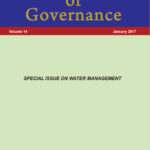The recent media discourse on rural distress seems to have created a new awareness about the need to strengthen village economy in the third decade of the century. The present government has made a significant declaration of its commitment to double farmers’ income in the next five years whether it is a realistically achievable goal or not. It is, therefore, expected that breaking away from the tenor of recent budgets, the budget for 2018-19 would be a predominantly farmer centric budget.
It has been the endeavour of the IC Centre for Governance to identify and underline the areas of concern in public governance and challenge the policymakers and opinion makers to respond. In this context, this issue of the Journal makes an attempt to focus on the strategies of rural development and related matters. We are convinced that those in governments would bring out more ambitious and innovative programmes and schemes to improve the economic and social infrastructure of our villages.
In the changing circumstances and environment when we are being led to think of a New India, the bureaucratic ecosystem has also to play a new role, the role of an agent of the people as compared to the traditional role of an agent of an absentee patron government. One of the questions the ‘poorest of the poor’ in the Naxalites affected areas of erstwhile Andhra Pradesh were asked in preparation for the Velugu community mobilization for poverty alleviation Project was ‘what did they think about the government’. And the dominant response was that they considered the government as their ‘enemy’. The main reason given for their resentment was the attitude of the village level functionaries of several developmental departments. The programme designers, therefore, made special provisions to counter this perception lest their efforts proved miserably subprime. Unfortunately, the planners have not taken pains to instill an attitudinal reorientation to public service at every echelon of the rural development bureaucracy.


